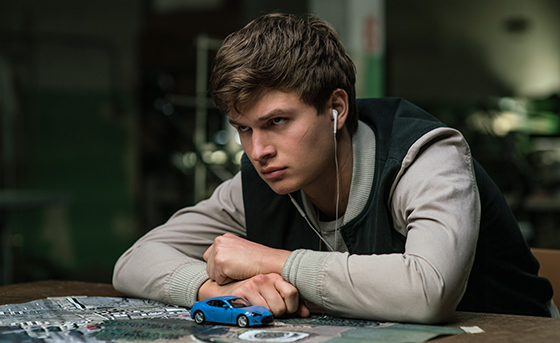The Millennial Falcon: What Wright Gets About Music that Chazelle Gets Wrong

Baby (ANSEL ELGORT) in TriStar Pictures' BABY DRIVER. Photo: Wilson Webb

In the climactic concert performance capping Damien Chazelle’s WHIPLASH in which Andrew Neiman (Miles Teller) furiously hammers out a drum solo to “Caravan”. Chazelle haphazardly intercuts close ups and split screens that neither correlate to the correct pieces of the kit nor convey the feverish intensity of John Wasson’s arrangement of the jazz standard. The typical counter-argument is that WHIPLASH isn’t a jazz movie. True. And SHINE isn’t a biography of Sergei Rachmaninoff, but the critical theme of both films is the short distance between perfectionism and madness.
Chazelle, a self-professed mediocrity of a musician, compounded his mistake with the saccharine, misguided LA LA LAND, in which black culture and the true origins of jazz take a back seat. Nothing is made of the fact that Duke Ellington wrote “Caravan”, nor does Neiman show any appreciation for Ellington or anything else he composed. Chazelle “hears the notes, if not the music,” with his obsessive, mechanical miscomprehension of “Caravan” and of jazz in general.
In “Whiplash,” the young musicians don’t play much music. Andrew isn’t in a band or a combo, doesn’t get together with his fellow-students and jam—not in a park, not in a subway station, not in a café, not even in a basement. He doesn’t study music theory, not alone and not (as Parker did) with his peers. There’s no obsessive comparing of recordings and styles, no sense of a wide-ranging appreciation of jazz history—no Elvin Jones, no Tony Williams, no Max Roach, no Ed Blackwell. In short, the musician’s life is about pure competitive ambition—the concert band and the exposure it provides—and nothing else. The movie has no music in its soul—and, for that matter, it has no music in its images.
– Richard Brody; “Getting Jazz Right At The Movies”, The New Yorker
Named for the Simon & Garfunkel tune, Edgar Wright’s BABY DRIVER is a musical disguised as a chase flick. The film opens on a heist, in which Baby (Ansel Elgort) is employed as the wheel man. Inspired heavily by Walter Hill’s THE DRIVER, Wright plunges us headlong into a riveting chase—the best I’ve seen since RONIN. Baby, constantly plugged into his iPod to drown out tinnitus caused by a childhood injury, cranks “Bellbottoms” recorded in 1994 by The Jon Spencer Blues Explosion. You’re ready to believe that Wright’s stand in for the OCD Neiman is just another millennial hipster glomming on to Gen X music for nostalgia. The title card hits, trumpets strike a familiar chord, but instead of House of Pain’s “Jump Around” we’re transported back to the source of that sample: Bob & Earl’s “Harlem Shuffle” (1963).
Just as quickly as we wonder how Baby developed his appreciation for the classics, we meet his foster father and a pile of records from vintage labels like Chess and Stax. But let me step back for a moment: The opening heist and ensuing chase are punctuated by swooping and swinging car-eography and the syncopated percussion of cleverly edited gunshot foley. Even as he returns to his apartment, the camera swings and sways in a single take across the living room and kitchen while Baby dances to Carla Thomas’ tune of the same name—earlier, he’d met a waitress quietly singing the words. Later, when the two hit it off, watch how the ringing in Baby’s ears ceases (sans music) and the DP dollies the camera around and around, in a restaurant, at the laundromat. The boy is smitten. The girl throws his equilibrium out of whack and, for a moment, he can stop thinking about what Doc (Kevin Spacey) will do to him if he doesn’t pay him off.
The visual poetry is always accompanied by the perfect song, and there are so many, from the soulful “Nowhere To Run” by Martha Reeves & the Vandellas to the smooth “Never, Never Gonna Give You Up” by Barry White—again, covered magnificently in the 90’s by Lisa Stansfield but Wright wants us to appreciate the original except in a couple of instances where he poignantly juxtaposes old and new versions: “Easy” by Sky Ferreira and the original by The Commodores, and Beck and T.Rex’s versions of “Debra”. From the frenetic “Brighton Rock” by Queen to Young M.C’s self-mashup “Know How”—Baby has a briefcase full of mixtapes—each track fits the scene to which it is coupled and gives us a virtual tour of blues, jazz, rock, funk, reggae and hip hop in a running time barely longer Chazelle’s broken record.
A word about Ansel Elgort. Suffice it to say he’s more compelling to watch than Lily James whom, sadly, Wright didn’t give much to do except inexplicably fall for and be whisked away by… The cherub-faced boy concealing a carnivorous smile plays Baby focused, with an economy of words—triggering what my wife refers to as a “competency kink”. Behind sunglasses—he owns more pairs than Elton John—Baby resembles a cross between Anthony Michael Hall’s awkward geek in THE BREAKFAST CLUB, and Tom Everett Scott’s drummer, Guy, in THAT THING YOU DO. Like Tom Hulce’s fictionalized Mozart, he’s a prodigy so insanely skilled, he waits out the heists not obsessively calculating his next move but playing with his wiper blades. This fits. Chazelle’s Andrew is, as Richard Brody observes about Buddy Rich, a technician, but Baby is a true band geek. Like Bruce Willis’ cat burglar in the misunderstood, mis-marketed absurdist comedy HUDSON HAWK, Baby’s technical application of music (timing out his escapes) is secondary to his aesthetic appreciation of the same.
Footnote: While Wright’s most obvious homage—Baby’s black-on-white vest-on-longsleeve—caught my eye immediately, I ruminated on the intended metaphor. And then it hit me….
You’ve never heard of the Millennial Falcon? It’s the Subaru WRX that made a robbery getaway in less than five minutes and sixteen seconds.